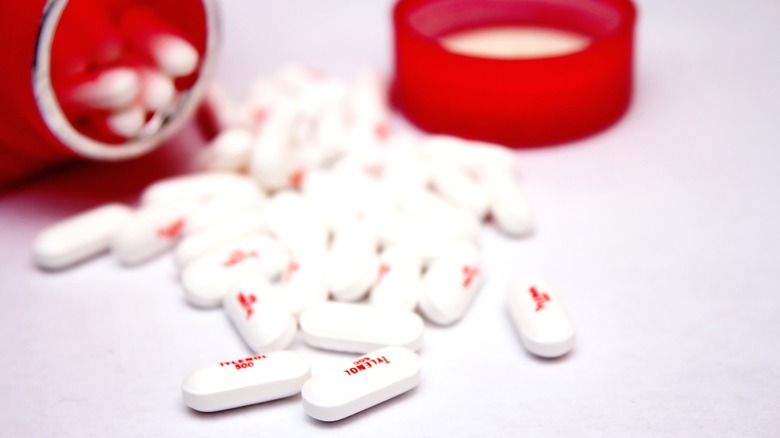Can Tylenol Damage Your Kidneys?
Tylenol, or acetaminophen, is one of the most commonly-used medications to relieve pain and fever. Given its relative lack of side effects and its being considered safe for all ages, it's used to treat a range of people, from infants to pregnant women (via GoodRX Health). Its popularity also stems from the fact that it doesn't tend to cause stomach problems or heart problems, which can be a risk for other over-the-counter pain relievers (via WebMD).
However, Tylenol use is not without its risks. According to UCI Health, overuse of Tylenol and other acetaminophen products is the leading cause of acute liver failure in the United States. Taking more than 4 grams of acetaminophen can lead to liver damage in just 24 hours. According to a 2016 study published in LiverTox, liver failure can happen even without prior liver disease.
The risk that Tylenol overuse poses to one's liver raises the question as to how it can affect other parts of the body, such as your kidneys.
Acetaminophen can be good for your kidneys
Although there are risks associated with Tylenol use, it generally does not pose a threat to your kidneys. In fact, according to GoodRx Health, it's preferred over other over-the-counter pain meds for patients diagnosed with kidney issues. Because Tylenol is broken down by your liver, by the time it reaches your kidneys, the medication is non-toxic.
However, that doesn't mean that you don't have to be cautious. According to MedlinePlus, acetaminophen overdose is one of the most common poisonings that can occur. A 2019 study published in Cureus showed that, when ingested in toxic amounts (100 grams or more), acetaminophen led to acute kidney injury in 2 to 10% of patients.
If you have low kidney function, according to the National Kidney Foundation, you should also be careful when using non-prescription painkillers. These medications can reduce blood flow to the kidneys over time and cause damage to the kidney tissue. Additionally, if you have kidney disease, you should avoid drinking alcohol while taking painkillers.
It's important to be smart when taking Tylenol
Despite the fact that Tylenol tends to not be harmful to your kidneys, you can run the risk of analgesic nephropathy (via Johns Hopkins Medicine). This happens as a result of damage to the blood vessels filtering to the kidneys due to long-term exposure. Signs of analgesic nephropathy include fatigue, blood in the urine, and pain in the back near the kidneys. However, you can also have no symptoms or symptoms that appear like a different condition. If you suspect that you are having any issues related to your kidneys while taking painkillers, consult with your doctor for an accurate diagnosis.
In general, you should not use over-the-counter pain medications for more than 10 days for pain and three days for a fever (via the National Kidney Foundation). During that time, you should increase your fluid intake to between six and eight glasses per day. And, if you have kidney disease, high blood pressure, liver problems, or heart issues, let your doctor know before starting any kind of pain management routine.



